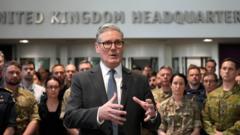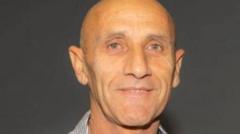Donald Trump's special envoy Steve Witkoff sharply criticizes UK Prime Minister Keir Starmer’s proposal for an international force to support a ceasefire in Ukraine, branding it as overly simplistic and merely performative.
Trump Envoy Critiques Starmer's Ukraine Ceasefire Proposal

Trump Envoy Critiques Starmer's Ukraine Ceasefire Proposal
Donald Trump's special envoy deems UK leader's plan "simplistic."
In an interview with pro-Trump journalist Tucker Carlson, Witkoff dismissed the idea of a "coalition of the willing" as reminiscent of past wartime rhetoric, stating that it's naive to think we need leaders to act like Winston Churchill. This comes on the heels of Starmer meeting military leaders in the UK to discuss potential strategies for Ukraine.
Witkoff, who recently met with Russian President Vladimir Putin, expressed an admiration for the leader, stating, “I don’t regard Putin as a bad guy; he’s super smart.” During his conversation, he recounted how Putin even prayed for Trump following an assassination attempt against him last year, cementing their somewhat surprising rapport.
Amidst all of this, Witkoff echoed several controversial Russian perspectives, notably claiming that Ukraine is a “false country” while demanding recognition of Russian-occupied territories. However, he struggled to identify the five Ukrainian regions that are either annexed or partially controlled by Russia—Luhansk, Donetsk, Zaporizhzhia, Kherson, and Crimea—reflecting a significant gap in understanding.
In his assertions, Witkoff made claims that were quickly disputed. For instance, he alleged Ukrainian soldiers were encircled in Kursk, a claim firmly denied by the Ukrainian government. Furthermore, while he pointed to referendums in occupied regions to argue that residents wished for Russian governance, these events were widely criticized for their questionable legitimacy and methodology.
Discussing the nature of Russia’s motives in Ukraine, Witkoff downplayed concerns over Russia's territorial ambitions, suggesting that they have achieved their goals with Crimea and the occupied regions. He pointed out that both Russian-speaking populations and history are often charted in narratives surrounding these conflicts.
Criticizing Starmer’s plans outright, Witkoff reacted to the notion of forming a military security coalition as overdramatized, insisting that NATO's presence today fundamentally changes the dynamic compared to World War Two. Nonetheless, he optimistically stated that a ceasefire in the Black Sea could be on the horizon, hinting at ongoing negotiations.
As geopolitical tensions continue to evolve, the dialogue surrounding Ukraine's future remains complex, heavily marred by sharply opposing narratives. While Witkoff champions a cooperative approach between the U.S. and Russia, many in the West argue for a more solid commitment to Ukraine's sovereignty and security.
Witkoff, who recently met with Russian President Vladimir Putin, expressed an admiration for the leader, stating, “I don’t regard Putin as a bad guy; he’s super smart.” During his conversation, he recounted how Putin even prayed for Trump following an assassination attempt against him last year, cementing their somewhat surprising rapport.
Amidst all of this, Witkoff echoed several controversial Russian perspectives, notably claiming that Ukraine is a “false country” while demanding recognition of Russian-occupied territories. However, he struggled to identify the five Ukrainian regions that are either annexed or partially controlled by Russia—Luhansk, Donetsk, Zaporizhzhia, Kherson, and Crimea—reflecting a significant gap in understanding.
In his assertions, Witkoff made claims that were quickly disputed. For instance, he alleged Ukrainian soldiers were encircled in Kursk, a claim firmly denied by the Ukrainian government. Furthermore, while he pointed to referendums in occupied regions to argue that residents wished for Russian governance, these events were widely criticized for their questionable legitimacy and methodology.
Discussing the nature of Russia’s motives in Ukraine, Witkoff downplayed concerns over Russia's territorial ambitions, suggesting that they have achieved their goals with Crimea and the occupied regions. He pointed out that both Russian-speaking populations and history are often charted in narratives surrounding these conflicts.
Criticizing Starmer’s plans outright, Witkoff reacted to the notion of forming a military security coalition as overdramatized, insisting that NATO's presence today fundamentally changes the dynamic compared to World War Two. Nonetheless, he optimistically stated that a ceasefire in the Black Sea could be on the horizon, hinting at ongoing negotiations.
As geopolitical tensions continue to evolve, the dialogue surrounding Ukraine's future remains complex, heavily marred by sharply opposing narratives. While Witkoff champions a cooperative approach between the U.S. and Russia, many in the West argue for a more solid commitment to Ukraine's sovereignty and security.




















